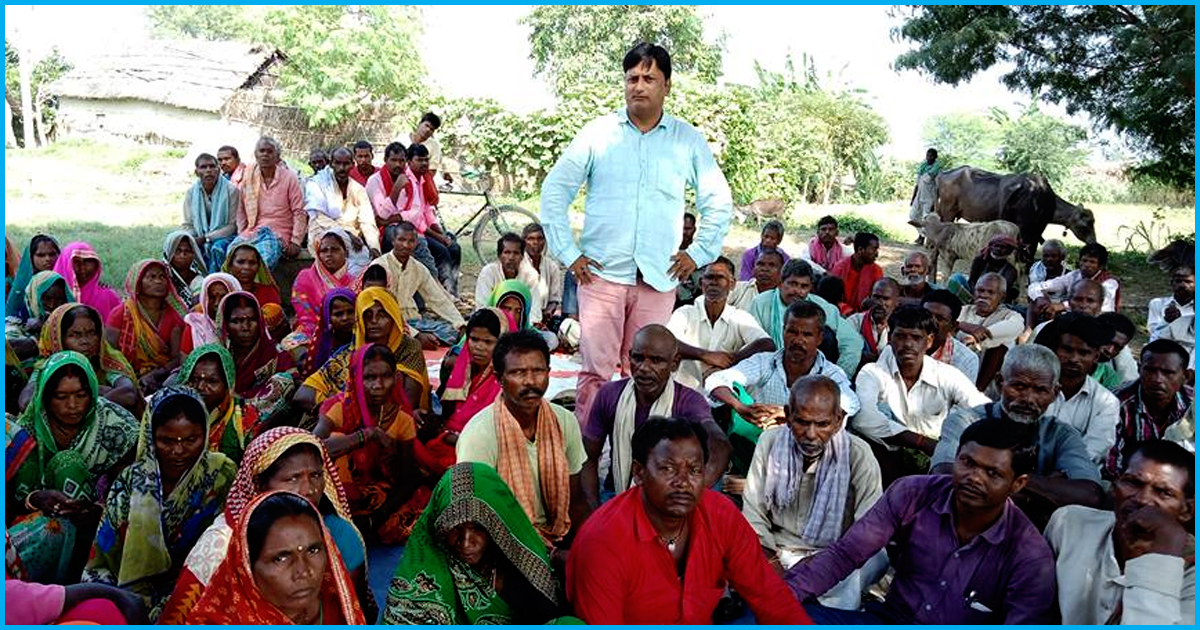
Meet Sanjeev Kumar, The Man Who Has Been Fighting Untouchability In Bihar Villages For 14 Years
14 Feb 2019 10:04 AM GMT
Editor : Sumanti Sen
Sumanti Sen is an English Literature graduate who believes "there's just one kind of folks. Folks.".
In a country where people talk about freedom and liberal mindset, caste system and untouchability is a harrowing reality in several parts of the nation. In 2019, it is perhaps difficult to imagine but untouchability is a glaring, tangible reality.
We read how untouchability is a wrong practice, we debate and argue, we write about it, but how many of us have really done something to bring about a change?
In the year 2005, Sanjeev Kumar from Delhi, an MBA graduate, was pursuing a career in modelling. A young man of 24, he was the youngest of five siblings. In the same year, after his sister’s mother-in-law’s demise, he had to visit Khagaria zilla in Bihar to attend a gathering arranged in her memory. Little did he know that his visit to Bihar was going to change his life forever.
His encounter with the Dom caste
During the gathering, a traditional ‘bhoj’ was arranged for the guests. Good food overwhelmed everyone, and as usual, a lot of food simply went into the dustbins.
“I was taking a stroll after the meal, and in a dark corner of an empty space, I saw some people scavenging the dustbins and eating the leftovers dumped into it. When I asked them, they told me they were treated as untouchable and they were not allowed to eat with the rest of the people. I was left speechless,” Sanjeev said in a conversation with The Logical Indian.
He immediately went back to have a word with his sister and her father-in-law.
“They told me that these people were untouchable and belonged to the Dom caste, and were not allowed to mix with society. I was not allowed to go near them either, he told me. However, I returned to Delhi with my parents but the sight of these people eating leftovers refused to leave me. I was scarred. Wherever I went, the picture followed me. I could not walk on the ramp. I started to dislike everything and everyone around me. Until that day, I did not know the chilling reality that untouchability was,” he said.

Sanjeev had enough of Delhi and his house. He had left his soul in the villages of Bihar, with the people who have never tasted freedom.
“I told my parents I wanted to go to Bihar and do something for them. I wanted to fight for their rights. But it was risky, my parents told me. The whole thing was political. It took me a year to convince my parents that staying here, going to expensive restaurants, eating good food had become impossible for me. In the same country, I felt like we and the untouchables were living in two different worlds. How and why were they different? What had they done? What was their fault? I had to find the answers to the questions that had troubled me for a year, and I had to erase the horrid picture that was embedded in my head, once and forever,” he said.
The beginning of the journey
In 2006, Sanjeev simply left his home. With a couple of clothes in a small bag, he sat on a train that would take him to Bihar. He had decided to put up at his sister’s place.
“I knew I could not tell them the real reason why I was here. They would not accept it. So I told him that I had simply come to visit them, and they were happy. At the back of my mind, I had a plan,” said Sanjeev.
Every morning, Sanjeev would leave for the area where the people from the Dom caste lived. He began learning about their lives. They survived on leftovers, hardly bathed and had no connection with the outer world. The only work they did was to clean toilets and even if they touched a tap, people washed it before using it. He remembered the meal they had had last year. His sister’s father-in-law had spent lakhs of rupees to arrange the meal for so many people, and yet what these people got were leftovers from the dustbin.
“However, in such a small area, words spread like wildfire. Soon, villagers saw me bathing, teaching and spending my days with these people. As expected, they complained to my sister’s family. They warned me, but I told them I could not give up on my mission. What is happening here is wrong, I told them. They are human beings just like you and me. They are made of flesh and blood. They feel pain, hunger and dismay just like we do. It’s wrong and I will have to win the battle,” Sanjeev said
Finally, Sanjeev was turned out of the house. Helpless, he went to his grandfather’s house in another village nearby. His grandfather was dead, but his father’s brother and his son lived their. They took him in.
“They took me in, but not for long. As words kept spreading about me, they had planned a trap for me. I came back home one day and saw people crying. And I saw a dead body on the floor,” he said. The villagers had fed his cousin poison. They had told his cousin that if he took a little bit of it, he would be fine, but he died. The plan was to put the blame on Sanjeev.

“Everybody knew I had not killed him, but everybody said so, just to turn me out of the village. However, one sensible man, who was the block development officer, helped me out of the trap, and I left the house. I rented a room in a different area, but it was not even a room. There was no electricity, no bathroom, I had to bathe in the open. But by then, I had become one among the Dom people. They had become my family,” he said.
The fight against untouchability
Among the many initiatives that Sanjeev took to fight against untouchability, he formed a group called Bahishkrit Hitkari Sangathan. People from other so-called untouchable castes, Chamar and Mushar, joined him.
“My daily routine included walking at least 16 kilometres to go round some of the 40 villages I was catering to, interacting with these people and empowering them. By this time, I had made a lot of enemies,” he smiled.
Sanjeev created separate panchayats comprising people from these castes. People among them became the sarpanch and took other leading positions. They held meetings and campaigns to spread empowerment.
“The untouchables were not allowed to touch the Ganga water, and I decided to break this “rule”. 400-500 people, with musical instruments and horses, went to bathe in the Ganga. Water is for everyone, and we would not let anyone tell us that a river is their right. The Ganga is as much ours as theirs. People were scared at the sight of us, and did not dare to stop us. We looked and felt like warriors. Finally, the women filled their matkas with water from the Ganga, and the rule was broken,” he said
From then onwards, with Sanjeev leading the group, the people made it clear that they will not clean toilets anymore. They will not eat leftovers. They will worship Gods and bathe in the Ganga. They will accept no more any form of discrimination.
“I was threatened at every point of my life. I was carried away by goons and almost killed. Local MLAs have threatened to kill me, and attacked me on several occasions, especially after, along with my people, began worshipping our Hindu Gods. I was beaten up and left half dead, but every time, I managed to live. Perhaps I was meant to live. Perhaps I will be dead soon. It does not matter. As long as I live, I will work for these people,” he said.

“With a lot of effort over the years, I have earned the support of some people who helped me get funds for my people. Aamir Khan has extended his support to us. The government has helped me arrange proper land and homes for them to live in. They have a life now. There are people who hug them and shake their hands. The best part is they have learnt to fight for their rights. A lot has changed in these villages in these 14-15 years, but a lot more has to change. Most people still hate them and believe they are untouchable. They hate me because I am one of them and any day they might be successful at killing me. If I die, I know they will fight for themselves. I have begun the revolution,” Sanjeev said.
Sanjeev is in touch with his family in Delhi, and they sometimes help them with funds. But he is not ready to go back. These Bihar villages and his wonderful people have won his heart.
“I don’t regret the fact that I left modelling, my city and my family. The urge and the passion to change the world came very naturally to me, and I have followed my heart. We sure are free from the British rule, but are we really free as long as we are not equal? Everybody is born the same from their mother’s womb, and their castes are decided only by us. We do not have the right to label a human being as anything other than a human being,” he said.
In between all that was going on, Sanjeev’s parents convinced him to get married.
“They thought this might make me come back to Delhi, but I was not ready for that. When my wife was pregnant, she left me. I have a son today, but have never seen him,” Sanjeev said.
Sanjeev gives us the hope that one day, we will all be free. We will all live with equality, compassion and love. He gives us the will to fight and the determination to stand up for ourselves. The Logical Indian salutes Sanjeev Kumar for his courage and will power.
Also Read: Doing God’s Work: This Haryana Man Has Been Burying Unclaimed Bodies & Rescuing The Needy For 35 Yrs
With #MySocialResponsibility, we aim to bring you more inspiring stories of individuals and organisations across the globe. If you also know about any changemakers, share their story at [email protected] and we'll spread the word.
 All section
All section













